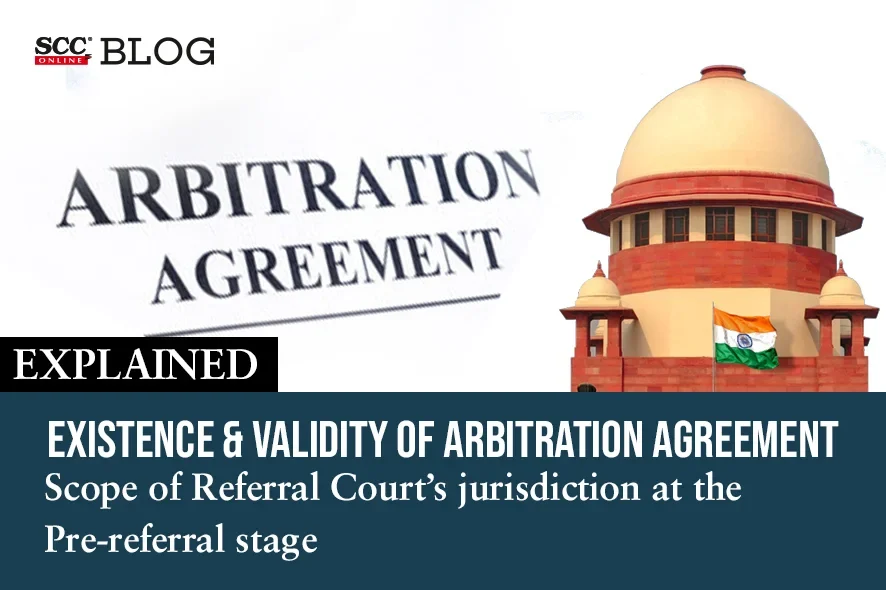Supreme Court: In case dealing with the issue of pre-referral jurisdiction of the Referral Court under Section 11(6) of the Arbitration and Conciliation Act, 1996, post- the Arbitration and Conciliation Amendment Act, 20151, the bench of MR Shah and CT Ravikumar, JJ has held that if the dispute/issue with respect to the existence and validity of an arbitration agreement is not conclusively and finally decided by the referral court while exercising the pre-referral jurisdiction under Section 11(6) and it is left to the arbitral tribunal, it will be contrary to Section 11(6A) of the Arbitration Act.
“It is the duty of the referral court to decide the said issue first conclusively to protect the parties from being forced to arbitrate when there does not exist any arbitration agreement and/or when there is no valid arbitration agreement at all.”
In the case at hand, the Delhi High Court had referred the disputes for arbitration and had appointed the sole arbitrator. This was, however, done without conclusively deciding the issue of the existence and validity of an arbitration agreement and had left it to be decided by the arbitral tribunal. It had observed that “this Court cannot finally pronounce one way or the other on this aspect”. It had also specifically observed that the arbitrability of the dispute raised viz-a-viz the arbitration clause of agreement, is an involved issue, can be addressed by the learned arbitral tribunal.
Considering these aspects, the Supreme Court observed that the referral court has not pronounced anything finally on the existence and validity of the arbitration agreement which ought to have been done by the referral court.
Reading Section 11(6A) of the Arbitration Act which has been added through Arbitration and Conciliation Amendment Act, 2015, the Court noticed that it is the duty cast upon the referral court to consider the dispute/issue with respect to the existence of an arbitration agreement.
As per the settled position of law, pre-referral jurisdiction of the court under Section 11(6) of the Arbitration Act is very narrow and inheres the following two inquiries:
-
The primary inquiry is about the existence and the validity of an arbitration agreement, which also includes an inquiry as to the parties to the agreement and the applicant’s privity to the said agreement. The said matter requires a thorough examination by the referral court.
-
The Secondary inquiry that may arise at the reference stage itself is with respect to the non-arbitrability of the dispute.
Observing that both are different and distinct, the Court explained that as far as the first issue with respect to the existence and the validity of an arbitration agreement is concerned, as the same goes to the root of the matter, the same has to be to conclusively decided by the referral court at the referral stage itself. Now, so far as the non-arbitrability of the dispute is concerned, even as per the law laid-down by this Court in the case of Vidya Drolia (supra), the court at prereferral stage and while examining the jurisdiction under Section 11(6) of the Act may even consider prima facie examining the arbitrability of claims.
“The prima facie review at the reference stage is to cut the deadwood and trim off the side branches in straightforward cases where dismissal is barefaced and pellucid and when on the facts and law the litigation must stop at the first stage.”
However, so far as the dispute with respect to the existence and validity of an arbitration agreement is concerned and when the same is raised at pre-referral stage, the referral court has to decide the said issue conclusively and finally and should not leave the said issue to be determined by the arbitral tribunal. The reason is that the issue with respect to the existence and validity of an arbitration agreement goes to the root of the matter.
The Court, hence, set aside the impugned judgment of the Delhi High Court and remitted the matter to the High Court/referral court to decide the issue conclusively and finally with respect to the existence and validity of the arbitration agreement.
[Magic Eye Developers (P) Ltd. v. Green Edge Infrastructure (P) Ltd., 2023 SCC OnLine SC 620, decided on 12-05-2023]
Judgment authored by Justice MR Shah
Advocates who appeared in this case :
For Appellant(s): Preetesh Kapur, Sr. Adv.;
Shaunak Kashyap, Adv.;
Nishtha Gupta, Adv.;
Mitter & Mitter Co., AOR;
For Respondent(s) Neeraj Kishan Kaul, Sr. Adv.;
Rooh-e-hina Dua, AOR.
1. Ed Note: The Supreme Court judgment erroneously mentions “Section 11(6) of the Arbitration and Conciliation Amendment Act, 2015”. While there is no Section 11(6) in the Arbitration and Conciliation Amendment Act, 2015, Section 6 of the 2015 Amendment Act provided for amendment of Section 11 of the Principal Act.








